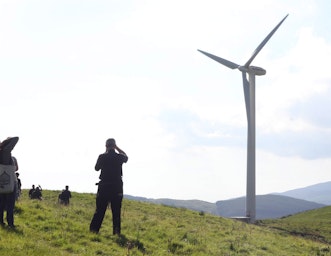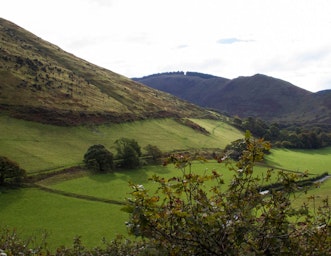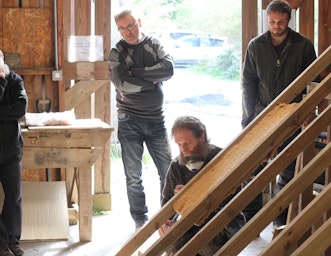
Carbon calculators, ecological footprints and offsets
Calulating where your carbon emissions and other environmental impacts come from is a very useful starting point for decarbonising your life. Another way of measuring impacts is with the ecological footprint method. There are several carbon calculator tools that can help you work out your emissions. Some of these also sell carbon offsets, but we think it’s better to invest in actually reducing your emissions directly.
Carbon Calculators
These allow you to measure your personal carbon dioxide emissions – the major cause of climate change. They ask questions about your lifestyle, including heating and powering your home, transport and perhaps food. The results show you which aspects of your life result in the highest carbon emissions, so you know where to make the biggest changes.
Online carbon calculators are often quite simplified. They may not cover all aspects (such as food), and will make assumptions and generalisations to simplify the questions. Also, they often don’t include the indirect emissions from industries and services that allow you to carry out your day-to-day life. For example, not only the emissions from a car exhaust, but also a share of the carbon that results from building and maintaining roads. There is also an ‘infrastructure share’ for the emissions from providing the services we all benefit from, such as building and running schools and hospitals. To reduce these emissions you’ll need to use your influence as a citizen to encourage the government to make services more climate-friendly.
Some carbon calculators were developed by companies selling carbon offsets – particularly for plane flights, which have a very high environmental impact. Efforts to reduce home energy use, compost or recycle waste, and invest in renewable energy can all be negated by just one return flight. However, we think it’s better to invest in avoiding carbon emissions in the first place. Or to donate directly to charities & non-profit organisations working in this area, rather than via an offsetting company. See below for more on offsetting.
Ecological Footprints
The ecological footprint is a way of expressing our impact on the planet more widely than with carbon emissions alone. It shows the amount of land used to provide us with everything we consume (energy, food, homes, travel, the things we buy, etc) and also to cope with the waste that we produce.
My eco-footprint can be expressed in terms of the number of planets that we’d need to absorb my impact if everyone on earth lived as I did. For example, if everyone lived like the average Briton we’d need three planets to mop up our carbon emissions, grow our food and dispose of our waste. The clear target is to become a ‘one planet’ person, and nation. An individual ecological footprint can be expressed in global hectares. An individual’s fair share is less than 2 hectares, but the average ecological footprint in the UK is over 5 global hectares per person.
The eco-footprint doesn’t measure everything. It can’t give us figures for the impact of some types of pollution, for the use of finite resources or aesthetic or social impacts. But it provides another way of seeing the relative impact of our actions, so that we can prioritise what we do to reduce our impact. The ecological footprint is a powerful educational tool, lending itself to games, practical workshops and creativity. It can help young people to understand global environmental and social issues.
Carbon Offsetting
Many companies promote methods of neutralising the impact of carbon emissions, such as investing in renewable energy or planting trees. However, we are very wary of offsetting, because what we really need to be doing is reducing our own emissions as much as possible. It’s better to spend the money on reducing your emissions at source by reducing heat loss from your home, buying energy from renewable sources, moving to low carbon transport and food options, and so on.
If you are a homeowner you could invest in the gradual retrofit of your home to a very high standard, and change to a form of low carbon heating. Or you could buy an electric car or bike to reduce the impacts of car travel. Or invest money into a community renewable energy scheme that will feed renewable energy into the UK grid.
Where alternatives are difficult or expensive, you could donate directly (rather than via an offsetting company) to charities & non-profit organisations working to improve options. For example a charity that is training up retrofit professionals and linking them with local people, to make home improvements more accessible.
If your own options are limited and you still want to investigate offsetting, then Ethical Consumer give more advice on avoiding bad offsetting schemes. As they mention, schemes that plant trees are not as common now, as there were many problems with how these were managed. We do need to address deforestation, but poorly sited tree plantations can have negative effects on habitats, water supplies and local people.
Examples of Calculators
CAT’s own Laura’s Larder is a detailed calculator for emissions from our diets. It gives you feedback on nutritional qualities and deficits as well as greenhouse gas emissions, and makes suggestions for improvements
The WWF Carbon Footprint Calculator and Carbon Independent calculators are fairly simple, and don’t try to sell you carbon offsets.
The EcoPassenger calculator compares the energy consumption, carbon emissions and other environmental impacts for passenger travel by plane, car, or train.
The Impact Community Carbon Calculator estimates the carbon footprint of your local community at various levels of local government, such as parish, town, or district.
The Global Footprint Network has a basic footprint calculator as well as more about ecological footprinting.
Related Questions
Related events


Build a Small Wind Turbine
6th September 2025
Introduction to Renewables for Households
13th September 2025
Renewables for Households: Insulation
8th November 2025Study at CAT: Our Postgraduate Courses
Related news

CAT Conversations: Sandy Stevens, CAT graduate
17th April 2025
CAT stories – Nick Parsons and Mike Russell
29th January 2025
Why we teach – communicating transformational social change
13th November 2024
WHY WE TEACH – ecological restoration
11th August 2024

Did you know we are a Charity?
If you have found our Free Information Service useful, why not read more about ways you can support CAT, or make a donation.
Email Sign Up
Keep up to date with all the latest activities, events and online resources by signing up to our emails and following us on social media. And if you'd like to get involved and support our work, we'd love to welcome you as a CAT member.
